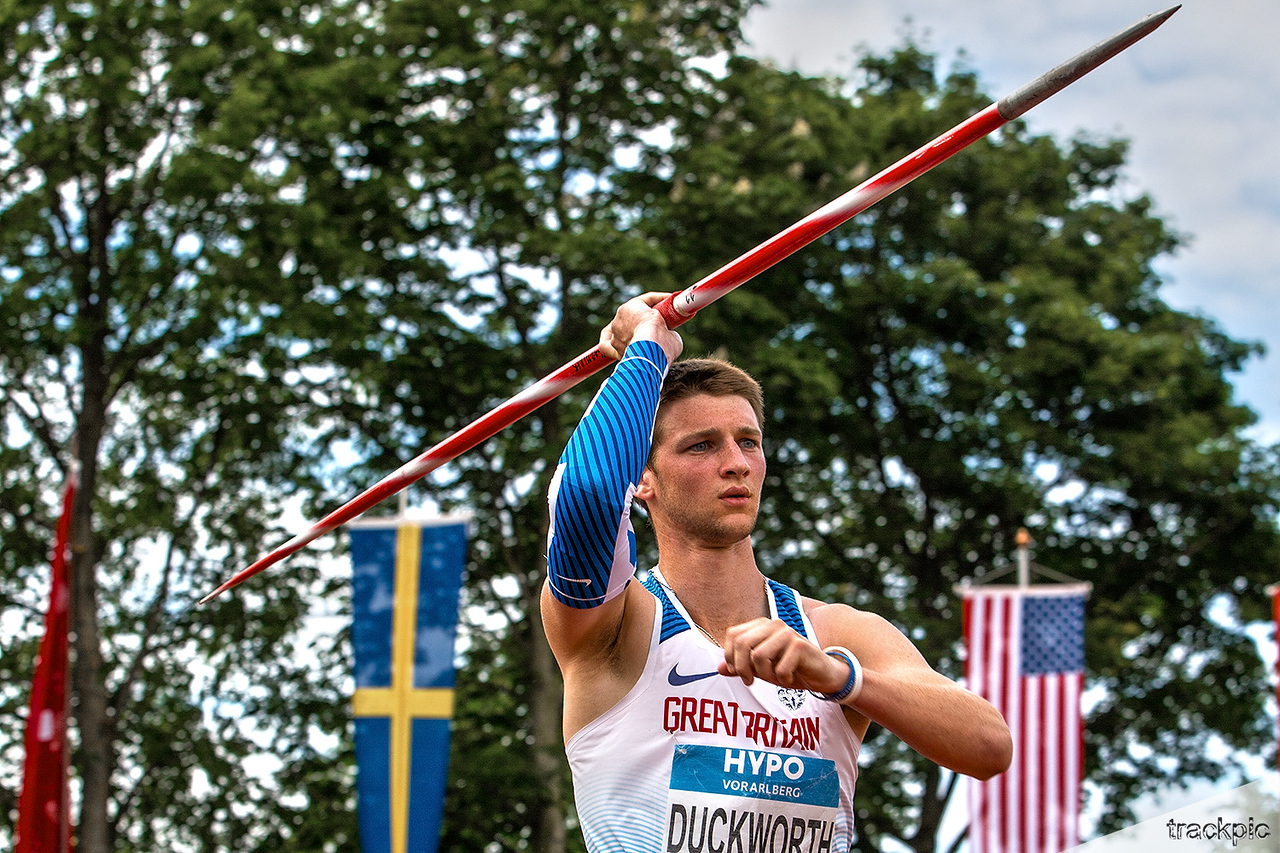It’s the eve of the 2021 British Championships in Manchester, and the 2019 European Indoor silver medallist Tim Duckworth is back in Loughborough. Reunited with his teammates after a long pandemic-enforced separation. Older, wiser, more assured and self-sufficient but – most importantly of all – healthy and ready to tackle his first decathlon in two years.
“I’m in really good shape,” he explains “and if I can get to start-lines healthy, we’re good to go for nice big scores. During the pandemic, I was able to stay in pretty good shape. I could go outside and run – I’ve been working quite a bit on my distance – and otherwise just focus on doing a nice, solid block of core work. We were fortunate in that not much changed for us, and it was really just business as usual.”
Tim sat out the pandemic at his base in Seattle with his partner, the twice-NCAA pole vault champion Liv Gruver, and their sassy corgi Harley (more on him later). With Tim’s parents only 90 minutes away, they were able to escape their small city apartment and enjoy the open spaces of Washington state to train until college facilities reopened and the return to a more regular routine, on the track and away from it.
“Seattle a great place to live,” Tim says. “Right now, we’re really close to downtown, just a mile from the Space Needle. There are so many restaurants, the music is great, and of course it’s right on the bay. On a clear day you can see Mt Rainier from the track, and so the setting is really nice. Compared to Lexington, it’s just the weather to get used to. But it’s just like English weather – and that’s why we have an indoor track!”
Duckworth’s path to the Pacific Northwest started in his college days at the University of Kentucky in Lexington, where he flourished under the guidance of his long-time coach, 2004 Olympic pole vault silver medallist Toby Stevenson. At the end of the 2018 season, in which Tim had won the NCAA title, Stevenson moved to a new post at the University of Washington. With just one more semester to go in his geology course, Tim stayed on to complete his studies and then followed Stevenson to Seattle.
Duckworth has now settled into a role as volunteer coach at the university, alongside full-time training. His training partner is 20-year-old GB teammate Ollie Thorner, who is also in Loughborough this weekend for the British championships.
“When I’m done with athletics, coaching is the route I want to take so I’m learning underneath Toby. I can learn a lot about the events, as well as train with the kids here. Ollie and I know how each other work, so we can help each other when we’re away from Seattle. And as long as Toby and I can get a little bit of video in, I can do my own thing while I’m here.”
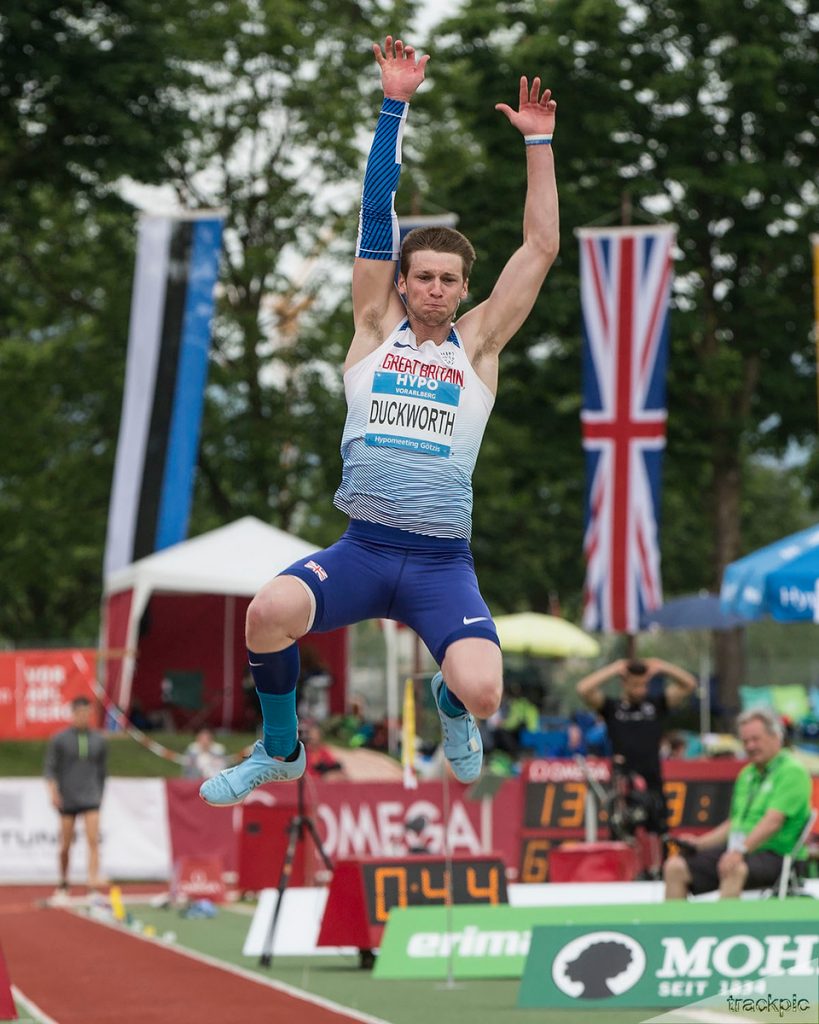
That self-sufficiency is a new string to Duckworth’s bow, following a challenging year in 2019. While the year started brilliantly in March with the European Indoor silver, the transition to post-collegiate life during the outdoor season was more uneven, a common experience for college athletes.
Instead of watching the world’s most famous decathlon via livestream at the NCAAs, Tim founded himself invited to participate in Götzis in May 2019. His debut was a rough one, with his coach back in the USA, and still adapting to the shift away from the highly structured and competitive environs of the college circuit. He finished 17th in 7981 points and at the time he reflected on the challenge:
“Getting out of competing every few weeks at a high level, where you’re competing against Grant Holloway, training with Daniel Roberts – you’re crisp over hurdles, considering you’re used to running against the guy that runs 13.0; you’re used to long jumping against 8.00m guys every other weekend. And so, it’s easy to get your energy up to compete to get up there in the rankings. So, it’s a hard year. It’s something I need to think about, learn about and move onto Doha and next year.”
Duckworth qualified for the World Championships in Doha in October 2019 but was the first casualty of the insanity that would become synonymous with the two days in Qatar. He experienced hip flexor pain in warmup and took the hard decision to scratch from his first global championships.
But the outdoor season still had its highlights, as he collected his second British long jump title with a jump of 7.92 in Birmingham in August. Duckworth had won his first British long jump title in 2018, and that was also the year in which he had broken through into world class.
He won both the indoor and outdoor NCAA championships, becoming the first Brit to win a combined event NCAA title, and only the second athlete to win both indoor and outdoor combined event NCAA titles.
He broke 8000 points for the first time at the famous Spec Towns Invitational decathlon at the University of Georgia in April 2018, finishing second to Maicel Uibo and leaping to 4th on the British all time decathlon list behind Daley Thompson, Dean Macey and Ashley Bryant.
He then improved that score to 8336 in winning the NCAA title to overtake Bryant for 3rd best all time. Those scores qualified Tim for the European Championships in Berlin where he finished 5th, again over 8000 points in 8160, one place behind the future world champion, Niklas Kaul.
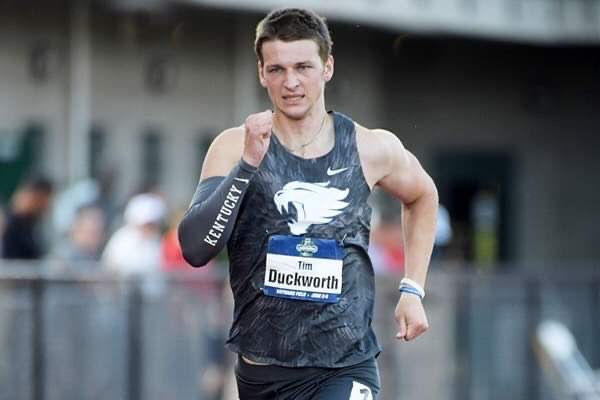
Tim carried that form into the 2018-19 indoor season where he became the first British man to win an indoor championships heptathlon medal, running the 1k of his life to finish second behind Spain’s Jorge Urena in 6156, just 9 points behind his own national record which he set in 2017.
“It’s really special to have that place in British history,” he says. “The decathlon in Britain doesn’t get the same love as the heptathlon because we don’t have an equivalent to Jessica Ennis or KJT right now. So, to be the one that helps move that forward is really, really special.”
“It’s actually kind of surreal, because when I came up through juniors, I wasn’t that good. I went to the European Juniors (Eskilstuna, 2015) and really didn’t perform that well, although I got food poisoning beforehand. And at the European U23s (Bydgoszcz, 2017) I ran a really quick 100m but then pulled my hamstring in the long jump. So that didn’t go well either.”
But Duckworth’s low-key results in the European age-group champs were not a fair measure of his talent and potential. Elsewhere, everything was starting to click.
“I started to improve, and improve, and improve,” he explains. “And that’s where the US system came in. Because we were told every day in practice what we needed to do, and how we needed to do it. That’s what you’re working towards every single day, and I grew up doing that with Garrett Scantling, Maicel Uibo, Lindon Victor and all those guys. So, it was just full tilt the whole time. That’s what I’ve got to do. That’s what I’ve got to be. That’s where I have to get to.”
“And that helped me get to the next level. It seemed such a far-fetched goal to hit 6k in the hep or 8k in a dec. And then once you hit it, and you hit pretty far over it, you realise that it’s not the hardest thing to hit. It becomes easier to hit it and go higher.”
Duckworth originally began his studies in mining engineering, following in the footsteps of his dad Ian’s speciality. But while he enjoyed the course, he couldn’t devote the time required to do it justice.
“There were only a few schools that did mining engineering, and Kentucky happened to be one of them. I also went to visit Virginia Tech and LSU. Kentucky was the one that felt like the right fit. The classes I took were really, really interesting. But then we got into the likes of thermodynamics, and I knew I couldn’t devote the time I needed while trying to compete at a really high level. So, I ended up majoring in geology.”
Duckworth’s science and engineering academic interests are similar to various of his peers: Estonia’s Johannes Erm studies mechanical engineering and Germany’s Niklas Kaul physics. What’s the attraction to the tough subjects?
“I guess we’re stupid and pick one of the hardest events do on track,” Tim laughs wryly. “So, it makes sense that we’re stupid and pick the harder subjects to study in school. I mean, who actually decides “let’s do ten events and cap it all off with the 1500?!”
As Tim emerged from his college career, his camaraderie with other student-athletes meant that his debut at the European Championships in Berlin a little less daunting.
“There were a lot of guys there that I competed against in the States, so it wasn’t like I was just there on my own, not knowing anyone. There was a familiarity. And Karl Saluri and I were really upset because we let Kevin beat us. We weren’t happy with that one!”
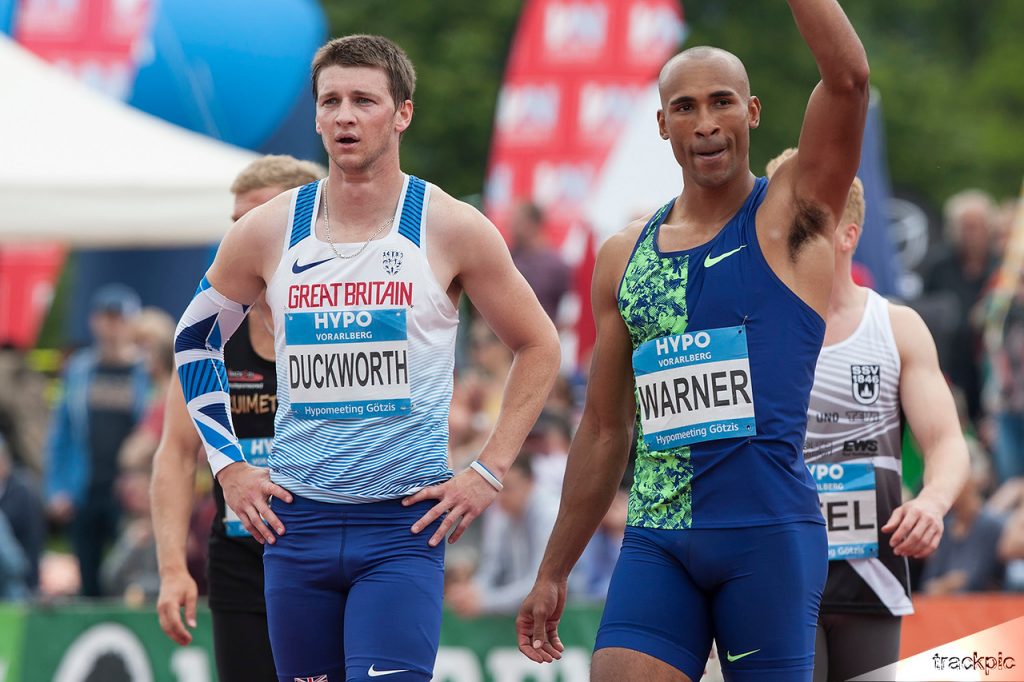
Duckworth is one of the best combination sprinter-jumpers in decathlon. He has a 100m PB of 10.40 – faster, indeed, than Kevin Mayer – and a long jump PB of 8.03. His high jump best is an impressive 2.17, and he has been over 5.11 in the pole vault.
At the US trials last weekend Zach Ziemek amassed the greatest number of points in history during a single decathlon for LJ-HJ-PV, but Duckworth is 6th on that list behind Ziemek, Tom Pappas, Ashton Eaton, Thomas Van der Plaetsen and Dan O’Brien.

But while, like all multi-eventers, those are the events to be optimised, he has seen improvements in his other events too. Earlier this year Tim improved his overall shot best to 13.84, and the lockdown workouts should stand him in good stead for the longer runs. But the college experience has also instilled in him the ability to respond to pressure and pull out big performances when it matters.
“Every point you score helps the team, and as the team places higher, the program gets more exposure, and the facilities get better. So, if I do better, the team does better, which then comes back to benefit you. But then when you’re in a 4×4 at the end of a meet, when it comes down to it you have everyone on your team on the home straight cheering you on. So, it’s like, I’m going to have to do this. It was like that in the 1k in Glasgow.”
The final event in Glasgow saw Duckworth at his best, improving his weakest event when it really mattered. While many had written off his chances, he responded to the home crowd screaming him on and delivered a 7 second PB to win silver.
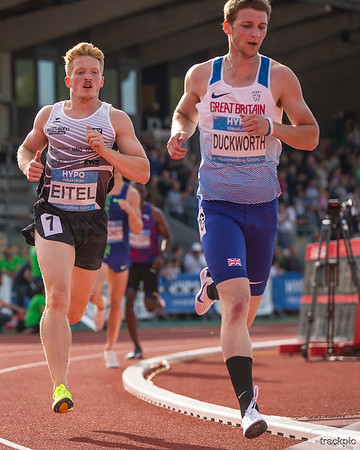
And while the home crowd will be a little sparser in Manchester this weekend, thanks to ongoing Covid restrictions, Duckworth feels just as passionately about putting on a show for them, as he competes for the first time in a decathlon at the British championships.
In previous years, the title of British champion in the multis was ill-defined, with the winner of the English Athletics championships (whatever their home nation) regarded as the unofficial British champion. With World Athletics anointing national championships with generous rankings points, clarity was required. But Duckworth had another reason for pushing for the inclusion of combined events in the British championships.
“We talked to people towards the end of 2020 to see if they would put a decathlon in there – I knew I might need a last-ditch effort to qualify for the Olympics. But it doesn’t make sense for us not to have the decathlon in there. If you want juniors to come through, they need to see people doing a decathlon at a British championships and being crowned British champion at a championships. We’re a big enough country that we should have a decathlon in our major championships.”
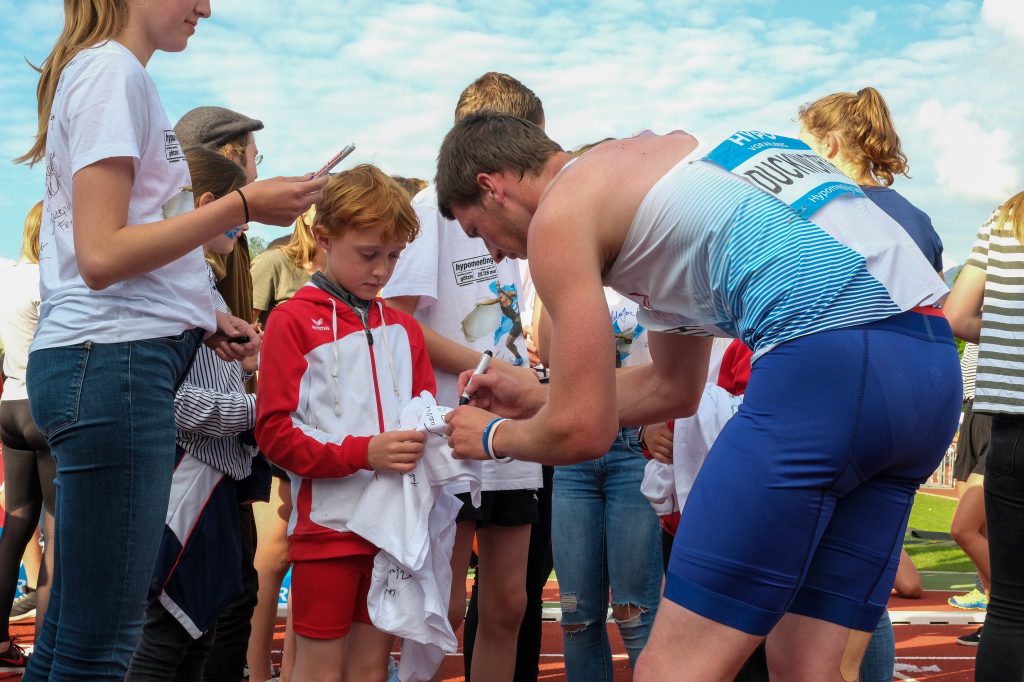
At the time of writing, Tim is positioned in 25th place in the “Road to Tokyo” qualification for the Olympic field of 24. His lifetime best is only 14 points short of the automatic qualification standard of 8350. A performance in the region of 8100-8200 to win the national title would ideally be enough to satisfy selectors, and more importantly likely to take him into the Olympic qualifying quota. And whatever he does, he will bring a little more love for British decathlon.
Beyond the unusual circumstances of 2021, the World Championships will of course come around again in 2022, and this time they will be on Tim’s doorstep, relatively speaking – “it’s just a 5-hour drive. It’s real close!”
And Hayward Field, home of the dramatic US trials decathlon last weekend, holds special memories for Tim.
“There was definitely something special about the old one for me – it’s where I won the NCAAs and got my PB at the same time as my girlfriend was doing the vault. But I’m sure that the new one is going to hold just as many memories to a whole new bunch of people. I know people were upset about it being torn down. But to move forward and host championships, you couldn’t host it with the old one. It couldn’t hold that many people. But by the looks of it from the US trials, it’s still fast. You can jump high, run fast and throw far – it’s still Oregon and it’s still Hayward Field, and I think it will still be one of the more iconic venues in the world.”
As Tim competes in the decathlon this weekend, his partner Liv will also be seeking to qualify for the US Olympic team, and then it will be back to Seattle for both to regroup for whatever lies ahead this summer. And, of course, to be reunited with their pup Harley whom, we understand, is on a diet.
“Harley – he’s just terrific” Tim beams proudly. “But he’s a little chunky right now. He’s a big boy. He is not a small corgi. And he has a lot of attitude. We thought he was the runt of the litter, but he just kept growing and growing. He’s a lot to rub and love. But he loves the camera. He knows when it’s on him and strikes a pose. I mean, he’s the cutest.”
So, the best of luck to Tim – and Liv – this weekend on their quest to go to Tokyo to represent GB and USA respectively; for whatever lies ahead beyond that, and to Harley on his mission to be a little less chunky.

“


